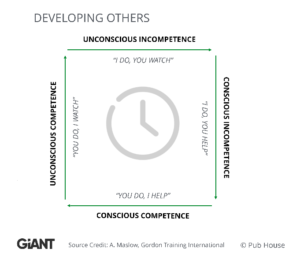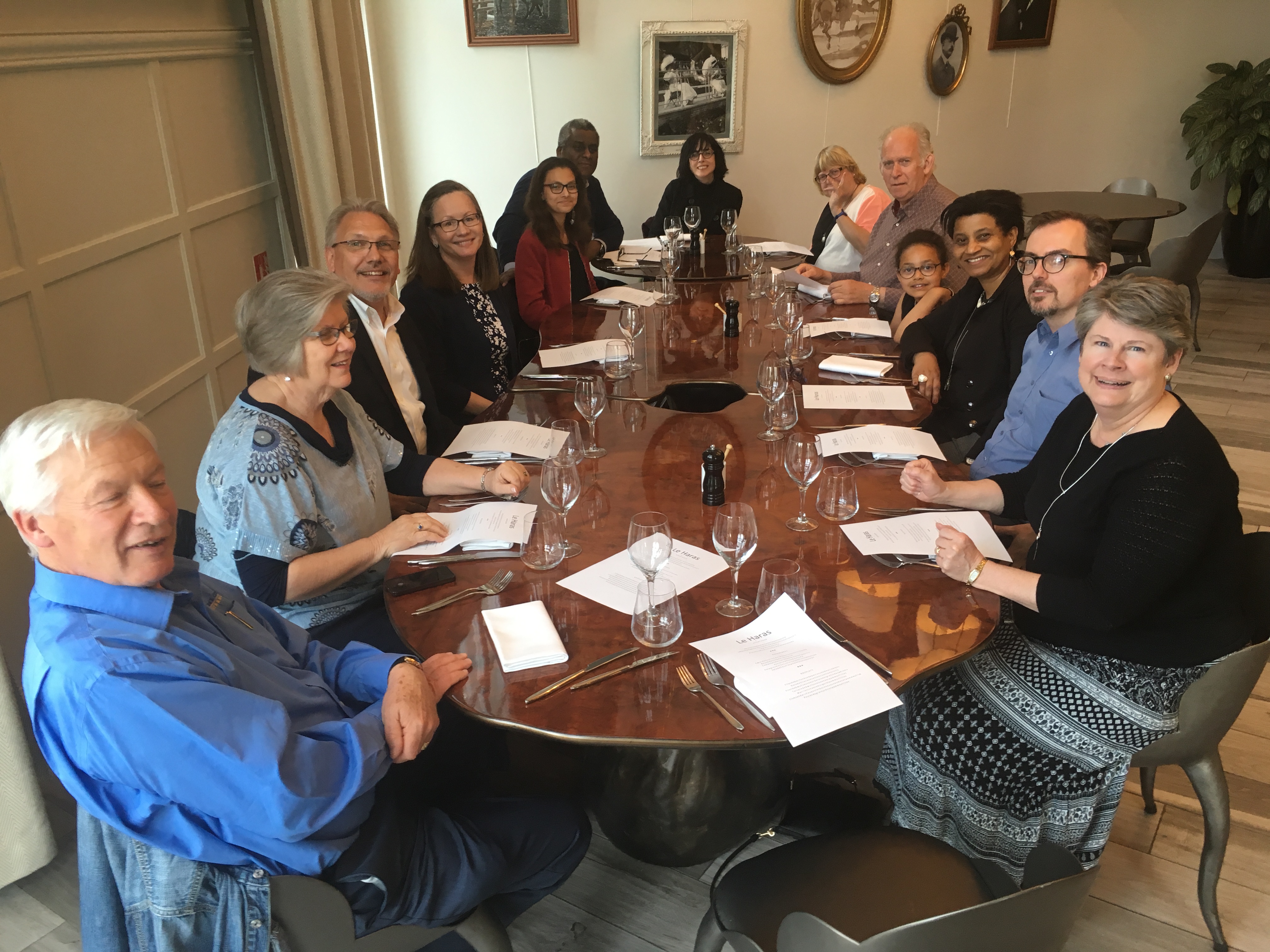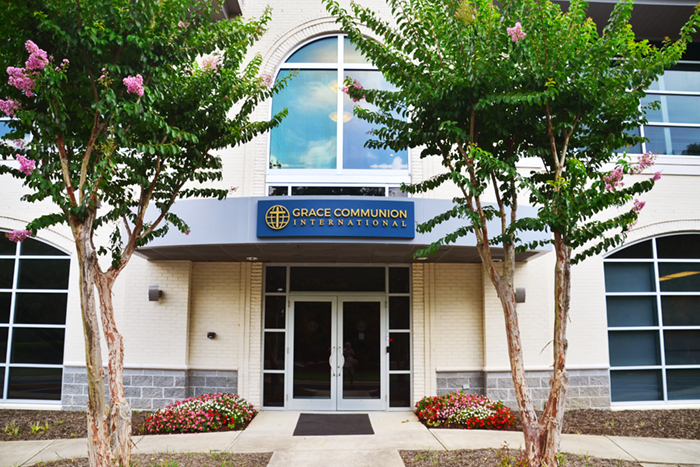GCI President, Dr. Greg Williams, gives an update on Grace Communion International.
He highlights October being Pastor Appreciation month and how appreciative we are for our pastors in GCI.
We say THANK YOU for your service and sacrifice!
Category: Hear From the President
The Posture of Grace

Dear GCI Family and Friends,
What does it mean to “think theologically” about current issues like politics, social justice, and worldviews? It begins with key questions: Who is the God revealed in Jesus? What is God’s nature? And what is God up to? These fundamental questions help us to think theologically and help form a foundation for informed conversations concerning societal issues.
Leaving God out of our thinking (or adding him when it suits our purposes), is the core issue facing a large part of our world (especially the English-speaking countries). Also problematic is an overarching under-developed view of God. Is it simple, perhaps naïve, for a Christian to believe that Jesus is the answer, no matter the complexity of the issue? When we plumb the depths of who Jesus is, then we know he is the answer; he is the deep, profound answer to complicated human issues. This doesn’t give Christians permission to stay uninformed about the world in which we live—rather, it challenges us to be aware of the times in which we live, while simultaneously being aware of the Lord’s presence.
What I often see in the news—especially among passionate Millennials—is that many conversations dealing with societal issues begin with the problem (be it abuse, injustice, or anything that “needs to be fixed”). The passion builds around the wrongness of the offense and is followed by a demand for action to fix the perceived problem. If God enters the conversation at all, the question is often: “How can a loving God allow such evil?” So where and how do we as believers enter the conversation and initiate a relationship?
You may recall the apostle Paul’s charge for the church to follow him as he followed Christ (1 Corinthians 11:1). The posture Paul took with the church at Corinth is applicable to the question “How do we gracefully and truthfully represent Jesus in the emotive polarized world of today?”
For our boast is this, the testimony of our conscience, that we behaved in the world with simplicity and godly sincerity, not by earthly wisdom but by the grace of God, and supremely so toward you. For we are not writing to you anything other than what you read and understand and I hope you will fully understand—just as you did partially understand us—that on the day of our Lord Jesus you will boast of us as we will boast of you (2 Corinthians 1:12-14 ESV).
Paul met questions and contentious issues head-on. He spoke confidently about his approach—the moral sensibilities of his conscience (a Spirit-guided sense of right and wrong), enhanced by his knowledge of God’s Word, and understanding the mind of Christ. It was from this platform that he shaped his conduct and communication in his relations with the Corinthians.
There are three important things to note about Paul’s conduct.
-
-
- It was with “simplicity” or the sense of singlemindedness that Paul wrote. He always pointed toward the Triune God, and the grace that flows from Father, Son and Spirit.
- His conduct was sincere, honest, and genuine. Being authentic carries a lot of weight.
- His motive was not in the vein of worldly wisdom, which is ultimately self-serving. He was instead guided by a love for others and sought what was in their best interests.
-
Paul’s letters matched his conduct: simple, sincere, and filled with God’s grace (I suspect that you notice in Paul’s tone that he operates out of “High Support”—love for the brothers and sisters and their best interest, and “High Challenge”—not backing down from ungodly behavior and failings within the church). Paul had no hidden meanings or ulterior motives in his correspondence with the Corinthians. With Paul, what you see is what you get, and he was the same way in his letters.
Paul knew that he had been more corrective with the believers in Corinth than with any other church, but he also believed his sincere motives and genuine love would win them over in the end. Compelled by the love of Jesus, Paul was tenacious and unrelenting in pointing them to Jesus. I believe his hope was that they would eventually come to vindicate him and even boast of him in the day of the Lord Jesus.
We can learn a lot from the consistency of Paul’s message, his motives and his conduct. Paul knew how to become all things to all people that he might win some to Jesus. We would do well to follow him as he so closely followed Christ. We would do well to allow the love of Christ to inspire us tenaciously and unrelentingly point others to Jesus. We would do well to be sincere, honest and genuine, and to let Christ’s love be our motivation.
My final thought is this: As followers of Jesus, Christians are uniquely empowered to display patience and tolerance. This is because we are well-founded in our relationship with Jesus and we know the convictions for which we stand. And just like the apostle Paul, our goal is about winning people, not arguments. We, who have been transformed by God’s grace, can operate out of the posture of grace no matter what the social climate brings.
Living in that posture in grace,
Greg Williams
Jesus, Irritated?

Dear GCI Family and Friends,
The writer of Hebrews says, “The word of God is alive and active. Sharper than a two-edged sword, it penetrates even to dividing soul and spirit, joints and marrow; it judges the thoughts and attitudes of the heart” (Hebrews 4:12). This verse reminds me to approach the Holy Scriptures with a “yieldedness” to the Spirit and a desire to relate more deeply to the Triune God. When we do this, the stories come alive and penetrate our innermost beings.
In my daily devotion, I am oftentimes surprised by things that never stood out previously. One of the recent surprises was noticing how even Jesus got annoyed and frustrated, especially with faithlessness and perverse thinking. One such example is his reaction after healing a demon-possessed boy.
“You unbelieving and perverse generation,” Jesus replied, “how long shall I stay with you and put up with you? Bring your son here.” (Luke 9:41)
Throughout the gospel accounts, Jesus was downcast by faithless responses. And it seemed to impact him most when his disciples displayed a lack of belief. This story takes place a day after Jesus, Peter, James, and John had come down from the Mount of Transfiguration. A great crowd met Jesus, and a father in the crowd begged that Jesus heal his son. The father tells Jesus, “I begged your disciples to cast it out, but they could not.” A key point to this story is found at the beginning of Luke 9.
Then Jesus called the twelve together and gave them power and authority over all demons and to cure diseases, and he sent them out to proclaim the kingdom of God and to heal (Luke 9:1-2).
Though these disciples had traveled with Jesus, had seen many miracles, and had been given the power and authority over demons, their lack of faith prevented them from healing the boy. You can understand Jesus’ dismay, which he expressed in his words.
As someone who is challenged on many fronts, I find it encouraging that even though Jesus was 100% God and man, and was filled with grace, truth, and love, he could get a little irritated and disappointed. The expressions of annoyance and frustration are a minor piece of his earthly experience, but these mark the reality of his humanity and it makes him human enough to identify with. He really did take on flesh and blood and he had to wrangle through the daily grind just as we do.
Certainly, crankiness was not the daily demeanor of Jesus. His day-in-day-out earthly ministry shows us that he continued forward no matter the negativity he faced, and his driving purpose was to raise humanity out of the generational cycle of faithlessness. The faithless bystanders—even if they included his disciples—did not deter Jesus from healing the boy and there is nothing that will keep the grace, truth, and love of Jesus from moving through the crowd and reaching us.
Prayer: Jesus, you were both divine and human, and you eternally maintain your connectedness to us humans in your glorified body. We thank you for temporarily setting aside your glory to join us in our mess, fully embracing humanity as one of us, and being the perfect example and perfect sacrifice that saves us. Amen.
So thankful for his humanity,
Greg Williams
Church Health: Lessons from Timothy and Titus

Dear GCI Family and Friends,
Have you ever noticed the relationship the apostle Paul had with his younger proteges? In his first letter to Timothy, Paul wrote like a father figure, calling Timothy, “my true son in the faith” (1 Timothy 1:2). In his second letter to Timothy, Paul writes more like a professor to a student: “Now you have observed my teaching, my conduct, my aim in life, my faith, my patience, my love, my steadfastness, my persecutions, and my suffering…” (2 Timothy 3:10-11). Timothy has journeyed around the Developing Others square with Paul, knowing what he teaches, and how he conducts himself in a range of circumstances related to church life. The relationship blossomed to the place that Paul calls Timothy “my fellow worker” (Romans 16:21). He was a colleague, or as Paul was famous for saying, “a yoke-fellow.”

Paul also had a close relationship with Titus, a Greek Christian whom Paul calls, “my loyal child in the faith” (Titus 1:4). Unlike Timothy, who had grown up in the faith through his mother and grandmother, Titus was a testimony to a changed life in Jesus and how Gentiles were being grafted into the church. Titus, who spent 15 years in missionary trips with Paul, was the one who carried the second letter to the church at Corinth (“the severe letter”). Paul identifies Titus as his partner and fellow worker (2 Corinthians 8:23). Paul knew that Titus would handle matters in Corinth in the same spirit and style as himself.
There was a lot of physical movement in Paul’s role as the apostle to the Gentiles, so frequently Paul sent Timothy as his ambassador. First Corinthians 4:17 tells us Timothy was sent to Corinth to remind the people there of Paul’s ways and teachings. Paul told the believers in Thessalonica he was sending Timothy to strengthen and encourage them in their faith (1 Thessalonians 3:2). Correcting false teaching and establishing sound doctrine was always a priority (the young New Testament church had to be discipled). We also see Timothy appointing elders and establishing church administration. (Paul’s letters tell us Titus did similar work.)
In Ephesus, Paul left Timothy behind to oversee the church. Paul had given three years of attention to the church in Ephesus, and it is known as one of the healthiest of the New Testament churches.
Paul also empowered Titus, sending him to straighten out Crete. Crete was the wild frontier where the gospel had only recently arrived. Paul describes the Cretans as, “rebellious people, idle talkers and deceivers, especially those of the circumcision; they must be silenced, since they are upsetting whole families by teaching for sordid gain what it is not right to teach. It was one of them, their very own prophet, who said, ‘Cretans are always liars, vicious brutes, lazy gluttons’” (Titus 1:10-12).
Paul gave Titus a ministry action plan, “I left you behind in Crete for this reason, that you should put in order what remained to be done, and should appoint elders in every town, as I directed you…” (Titus 1:5). In other words, “be a living example of what a Christian should be. Don’t just go there and teach what a Christian should be like, but show them what they can be, just as you were transformed in Christ.”
What a great compliment to both Timothy and Titus that they could be trusted lieutenants who could be assigned to a church and a region that allowed them to be the second generation of leaders in the New Testament church.
Summary
What do we learn about church health from the parallel stories of Timothy and Titus?
- Pastors/leaders have different backgrounds and different personalities. Timothy appears to be more tender-hearted and prone to melancholy, and yet an able teacher for furthering and defending the gospel. Titus seems competent and trustworthy to carry out his assignments – even if he is working with brutes and liars. Paul invested heavily in both young men.
- Churches are in different stages of development and can differ in the challenges they face. Even mature churches will face challenges when the glory isn’t channeled back to God. We have no other choice than to work out of our present reality.
- Discipleship is the ongoing work of the church. Sound teaching is great, but it is only impactful when the fruit of the Spirit is evident in the lives of the leaders, and they are living their lives in community with the church and neighborhood.
- Development of future leaders will always be the ongoing work of the church. True mentoring is a lot of work and takes a lot of time – Titus traveled with Paul for 15 years. Because of Paul’s skillful, intentional development of Timothy and Titus, I am certain these men took to heart the charge from 2 Timothy 2:1-2 to purposefully pass along the faith and ministry skills they learned to other reliable men and women. Timothy and Titus could mentor well because they had been mentored well.
Titus’ successor, Andreas Cretensis, eulogized him in the following way: “The first foundation-stone of the Cretan church; the pillar of the truth; the stay of the faith; the never silent trumpet of the evangelical message; the exalted echo of Paul’s own voice” (Philip Hughes, Paul’s Second Epistle to the Corinthians).
Titus and Timothy were excellent proteges who faithfully followed Paul as Paul walked in the footprints of Jesus. Brothers and sisters, isn’t this the same echo we want to resound in the young proteges who are under our care? May the faith go forward with the future Timothys and Tituses to come.
Dedicated to developing others,
Greg Williams
Tragic Mass Shootings and the Hope of Jesus
Grace Communion International is one of 40 members of the National Association of Evangelicals. Recently the NAE released this motion.
At a time when terror and violence are wreaking havoc in so many parts of our world, we remember that Jesus also endured persecution and violence on our behalf. Through his suffering, death and resurrection he opened the way to life for all humankind. May the faithful witness of the martyrs “of whom the world is not worthy” (Hebrews 11:38) draw many to put their faith in Christ, our only hope.
I don’t know how you may respond when you hear the back-to-back news of the shootings in El Paso, TX and Dayton, OH. Shock and outrage are common as the news streams across television stations and the internet. And then social media overwhelms us with a wide range of views on what immediate actions are needed (most responses are not helpful).
As Christians we are reminded of how broken this world is, and with the escalation of such stories, it’s easy to become desensitized. As Christians we should mourn and grieve for the senseless loss of lives, while we pray for peace and hope for the families and friends of the victims. And we must not forget to pray for the families of the shooters as well.
As the NAE motion states, “May the faithful witness of the martyrs ‘of whom the world is not worthy’ draw many to put their faith in Christ, our only hope.” The only hope to resolve the broken, violent attribute of humanity is for people to become new creatures in Christ. I pray that the Christian communities in El Paso and Dayton will rise up as genuine representatives of Jesus and be loving peacemakers who can point their neighbors to the only real hope, Jesus. May the church be the church to their communities in crisis.
As we pray for the hurting people of El Paso and Dayton, and the churches that serve them, let’s remember that we are beseeching a living God who is not absent or aloof in these tragedies, but is present in the person of Jesus Christ. We lament for the families whose lives have been forever altered, we lament for the police and medical workers who will be impacted by the memories of these horrific episodes, and most of all we lament the hate that fueled this violence. In our reflection and lamentation let’s be reminded of how much our world still needs to hear about the redeeming work of Jesus, and to be changed from people of anger, hate and violence, to people of love, joy and peace. Let’s be those messengers who tell others about the life-changing Jesus, Son of God and Son of Man.
The news of these tragedies is not as surprising as it once may have been, and unfortunately, we will hear more such reports as time goes by, so how will we respond? The sense of deep pain and loss is natural; the wrongness and the senselessness are also natural, but for those who trust in Jesus, despair is not an option. Despair leads to hopelessness and demise. In tragedies like our country experienced over the first weekend of August, it drives believers to their knees before the throne of heaven, and to come away knowing that as strong and penetrating as our laments may be, they are framed in the hope and promises of a sovereign God who will make all things new in his time. Events that may shake our faith are surprisingly events that build our faith.
Praying for the peace of the world.
Greg Williams
Readiness

What does it mean for a believer to be alert and prepared in anticipation of the second coming of Jesus? That question could get all kinds of different answers from many people, but what does scripture tell us?
The book of Revelation represents God’s people as the “bride” to be joined to Christ, the “bridegroom.” The apostle John wrote, “his bride has made herself ready” with “fine linen, bright and clean,” which is “the righteous acts of God’s holy people” (Rev. 19:7–8). So, we see that the bride—the church—continues to grow in grace and knowledge of Jesus until his appearing. The bride is in a state of readiness.
In 1 John we see a further connection between eschatological hope and ongoing spiritual purification: “But we know that when Christ appears, we shall be like him, for we shall see him as he is. All who have this hope in him purify themselves, just as he is pure” (1 John 3:2–3). Peter also wrote about this in light of the world’s coming dissolution. He says, “You ought to live holy and godly lives as you look forward to the day of God and speed its coming” (2 Peter 3:11–12). And Paul’s letter to Titus connects our “blessed hope” (Titus 2:13) with a summons “to live self-controlled, upright and godly lives in this present age” (Titus 2:12). The New Testament paints a progressive picture of believers actively participating in the Spirit’s transforming work and growing up into the stature and fullness of Jesus. In other words, it shows believers being in a state of readiness.
From a pastoral standpoint, these passages suggest we evaluate eschatological teachings in terms of their practical effects. Do our lives reflect a state of readiness in our anticipation of Jesus’ return? I’d suggest it is exceedingly difficult to see how the biblical call to self-denial and godly living—being in a state of readiness—can flourish in the realm of universalist theology. Who would need to focus on cooperating with the Spirit’s work in their personal life, or be watchful and alert to the Lord’s second coming if a universalist outcome were already known in advance? Some Christian universalists, including Origen, acknowledged this problem and suggested that universalism should be kept secret from the masses and disseminated among only a select few. A novel approach, and I would add that the scripture clearly acknowledges that Jesus knows who belongs to him and none will be snatched from his sure hands (John 10:27-29). Thankfully, we don’t have to bridge the problem stated by Origen. We don’t judge the readiness of others; we point them to Jesus. We can let Jesus be the final judge of humanity and rest assured that he will sort it out perfectly.
In Matthew 24, Jesus answers the disciple’s questions about end-time events and what to expect in their future. While Jesus primarily responded to the pending destruction of the temple in 70 A.D., he also shared certain principles that apply to his followers throughout the ages. We are to watch and continue as faithful servants – in essence, to continue Living and Sharing the Gospel (GCI’s mission statement). “Blessed is that servant, whom his lord when he comes shall find so doing” (Matthew 24:46).
Readiness is not being hunkered down in a Y2K fashion. We aren’t in the drama “The Walking Dead” fighting for survival. We are in a state of readiness—continually fulfilling our God-given mission of Living and Sharing the Gospel; as we live peaceable lives, caring for our families, active in the ministry of our church, and sharing the love of Christ where and when we can. Always praying come, Lord Jesus, come.
In readiness for his return,
Greg Williams
Importance of a Name
Vibrancy

Dear GCI Family and Friends,
Throughout my letters and articles, you’ll notice I continually circle back around to the vision of Healthy Church. With Jesus as our chief cornerstone, Healthy Church is the clear path that the Holy Spirit is taking GCI. I am pleased there is enthusiastic support for this journey forward.
As I travel the globe building relationships and sharing a vision with pastors and churches in the 78 countries where GCI has a presence, I have my eyes open to Healthy Church sightings. I recently had multiple sightings on my trip to Accra, Ghana.
Under the leadership of African Superintendent Kalengule Kaoma and Regional Director of West Africa Emmanuel Okai, we held a wonderful three-day conference over the Easter weekend. During our leadership meetings, while sharing a story of one of the healthier churches in his region, Pastor Okai used the alluring word “vibrant.”

Vibrant means: energetic, bright and full of life. Energetic in the sense that there is passion and determination; bright refers to being brilliant, attractive and striking; full of life implies a life that is stimulating, dynamic, and life-giving. Vibrant is a powerful adjective to describe healthy church.
I quizzed Emmanuel on what factors fed into the vibrancy of the church he was praising, and he didn’t hesitate. He spoke freely about the following attributes:
- This church is not only multi-generational, but they also have active families with youth. Did you get that? Families where parents and children are actively participating and serving in the life of the church.
 There is outstanding worship with lively worship music. Not just a few songs that serve as an introduction for the sermon to come, but music where people are singing loudly, passionately and from their hearts. In Africa, the worship includes all ages dancing up the aisles to the front, waving their handkerchiefs, and worshipping with their entire being.
There is outstanding worship with lively worship music. Not just a few songs that serve as an introduction for the sermon to come, but music where people are singing loudly, passionately and from their hearts. In Africa, the worship includes all ages dancing up the aisles to the front, waving their handkerchiefs, and worshipping with their entire being.- Vibrancy hinges on the value of including all members in places where they best fit, with an eye on the younger emerging leaders. Emmanuel is keen about seeing the existence of “farm systems” where younger leaders are being groomed to take on significant roles in the church. This is more than a value or system; this is a culture that is formed over time.
 I loved how Emmanuel shared these signs of health and vibrancy. He was passionate in wanting the other leaders to move in this direction, and I am fully on board with this goal. A great reminder he shared with the group is that many of our younger ones hold responsible positions in their workplace, and yet we tend to hold them back from greater responsibilities in the church. He asked the group “How old were you when you were ordained or asked to pastor your first church?” It gave me pause to think. I was 26 when I was ordained an elder, and I pastored my first church at age 30. I am grateful I was given the opportunity to participate in ministry at an early stage in my life.
I loved how Emmanuel shared these signs of health and vibrancy. He was passionate in wanting the other leaders to move in this direction, and I am fully on board with this goal. A great reminder he shared with the group is that many of our younger ones hold responsible positions in their workplace, and yet we tend to hold them back from greater responsibilities in the church. He asked the group “How old were you when you were ordained or asked to pastor your first church?” It gave me pause to think. I was 26 when I was ordained an elder, and I pastored my first church at age 30. I am grateful I was given the opportunity to participate in ministry at an early stage in my life.
 I encourage you to thoughtfully consider these attributes of vibrancy. I invite you to join me in the quest to identify even more signs of good health as we live out a Christian life in this community called church.
I encourage you to thoughtfully consider these attributes of vibrancy. I invite you to join me in the quest to identify even more signs of good health as we live out a Christian life in this community called church.
Praying for a vibrant GCI,
Greg Williams
European Community of Practice

Dear GCI Friends and Family,
During the last week of April, Susan and I had the pleasure of meeting several GCI leaders and spouses in Paris. We met with European Superintendent James Henderson (Shirley), National Ministry Leader of The Netherlands Frans Danenberg (Lamberta), National Ministry Team Leader of UK and Ireland Gavin Henderson (Sinead), and National Ministry Leader of France Marie-Angelique Alcindor Picard (Jean-Philippe). Husband and wife team, GCI Treasurer Mat Morgan and GCI Operations Coordinator Pam Morgan also participated in the meetings.
This was our first European Community of Practice meeting. A “Community of Practice” is a group of like-minded leaders who are working together to fulfill a shared vision, support one another, and share resources. These important gatherings are used to share news about our current status (strengths, weaknesses, opportunities and threats); to share lessons we have learned, innovative ideas that may be of value to the group, and to consider ways we can bolster the ministry efforts across the region. We have six such groups in GCI.
 This meeting took place in the Picards’ home, where we were given a taste of French life with many delightful foods in the comfortable environment of a private home. James started our time together with communion—always a good and appropriate way to acknowledge the presence of Jesus in our lives and ensuing discussions as we seek to follow him in caring for our churches.
This meeting took place in the Picards’ home, where we were given a taste of French life with many delightful foods in the comfortable environment of a private home. James started our time together with communion—always a good and appropriate way to acknowledge the presence of Jesus in our lives and ensuing discussions as we seek to follow him in caring for our churches.
Many gave reports about the status of our churches inclusive of challenges and opportunities. I dubbed 2019 my “Year of Discovery,” and during these meetings, I learned much about our churches spread across the European region (with more yet to learn). As much as growing in understanding of the state of our churches is part of my job, building relationships with the leaders is of equal importance.
 Establishing relational chemistry is vital in establishing trust, and it takes trust to form meaningful working relationships that help us to collaborate and experience the synergistic energy of the team. Permit me to share a story that better describes relational chemistry (with permission from Marie-Angelique).
Establishing relational chemistry is vital in establishing trust, and it takes trust to form meaningful working relationships that help us to collaborate and experience the synergistic energy of the team. Permit me to share a story that better describes relational chemistry (with permission from Marie-Angelique).
Shortly after James shared communion, the meeting moved to open discussion. Marie-Angelique, who is known for her honesty as much as for her gracious hospitality, openly stated, “We know Joseph Tkach, but you, we don’t know you.” I thought that was fair, and I decided to put my PowerPoint presentation aside. We spent time getting to know each other and I allowed the meeting to follow the course of topics most concerning to the group.
 The day after our meetings, we attended the Paris church and celebrated with them in the new hall they were able to purchase. The hall is still being modified into a functioning church facility, but we are excited because it is in a wonderful part of the city. During the service, the members were provided headsets so the French-speakers would be able to hear an interpreter for my sermon message. However, the headsets were not working properly, and prior to my message, Marie-Angelique told me, “We will have to do this sequentially.” This meant I would speak a sentence or two in English and she would then translate in French. Though it seems awkward, the comments from many in attendance were overwhelmingly positive. It appeared to them that Marie-Angelique and I were giving the sermon as one voice and our rapport with one another was apparent. Chemistry and trust were being built.
The day after our meetings, we attended the Paris church and celebrated with them in the new hall they were able to purchase. The hall is still being modified into a functioning church facility, but we are excited because it is in a wonderful part of the city. During the service, the members were provided headsets so the French-speakers would be able to hear an interpreter for my sermon message. However, the headsets were not working properly, and prior to my message, Marie-Angelique told me, “We will have to do this sequentially.” This meant I would speak a sentence or two in English and she would then translate in French. Though it seems awkward, the comments from many in attendance were overwhelmingly positive. It appeared to them that Marie-Angelique and I were giving the sermon as one voice and our rapport with one another was apparent. Chemistry and trust were being built.
I spent the final day with James recapping what we had heard and establishing provisional plans for work that he will attend to – though good, a supervisor’s work has no end. My work with our European brothers and sisters will continue as I plan to visit the UK in November. I will sit in as a guest at their Board meeting, and spend time with Gavin in their Home Office. I am also looking to returning to France in 2020 and spending more time in relationship building at their annual celebration in Evian.
I am discovering how wonderful our GCI leaders are, and I continually thank God that he has raised up such faithful men and women for such a time as this.
Praising God for faithful leaders,
Greg Williams
Celebrate Church

Dear GCI Family and Friends,
I recently had the opportunity to visit a church in the Carolinas and give the sermon. The main passage in the Revised Common Lectionary for that day was in Luke 15. This chapter has three stories about lost things.
Whether Jesus was talking about a lost sheep, a lost coin, or a lost son, he masterfully wove these stories together with the theme of rejoicing and celebrating by throwing a party.
After finding the lost sheep the Shepherd says:
And when he comes home, he calls together his friends and neighbors, saying to them, “Rejoice with me, for I have found my sheep that was lost” (Luke 15:6 ESV).
After the woman finds her lost coin, she follows the same pattern:
When she has found it, she calls together her friends and neighbors, saying, “Rejoice with me, for I have found the coin that I had lost” (Luke 15:9 ESV).
And it’s even a bigger deal when the prodigal returns home:
But the father said to his servants, “Quickly, bring out a robe—the best one—and put it on him; put a ring on his finger and sandals on his feet. And get the fatted calf and kill it and let us eat and celebrate; for this son of mine was dead and is alive again; he was lost and is found!” And they began to celebrate (Luke 15:22-24 ESV).
The object of celebration in these stories is abundantly clear—the joy of a rescued sinner whose heart is turned toward his or her heavenly Father. And the earthly celebration is augmented by the party that is happening in heaven of the angels before the presence of Father, Son and Spirit. This is a good place to pause with wonder. When a person comes to their senses and understands their belonging as a son or daughter to the divine Father, that they are already loved and accepted in Jesus, and they take hold of this reality, the only response is to celebrate and throw a party.
In 2019, the regional gatherings in the U.S. are being called Regional Celebrations. Though the past conferences have been good and informative, we want to go beyond conferring and sharing information; we want to join together in a spirit of joy and to have a festive spirit of a God-honoring party.
As believers, we have more to celebrate than any other people on earth. The sense of rejoicing over our salvation, over the relationships we share in the community of the church, and over our enduring focus is that we anticipate the hope of the lost sinner being rescued and participating in the party that happens on earth and in heaven.
A Healthy Church is a church that regularly celebrates and throws parties over people who were lost but now are found. Let’s continue to celebrate the Good News.
Party on, Church!
Greg Williams












